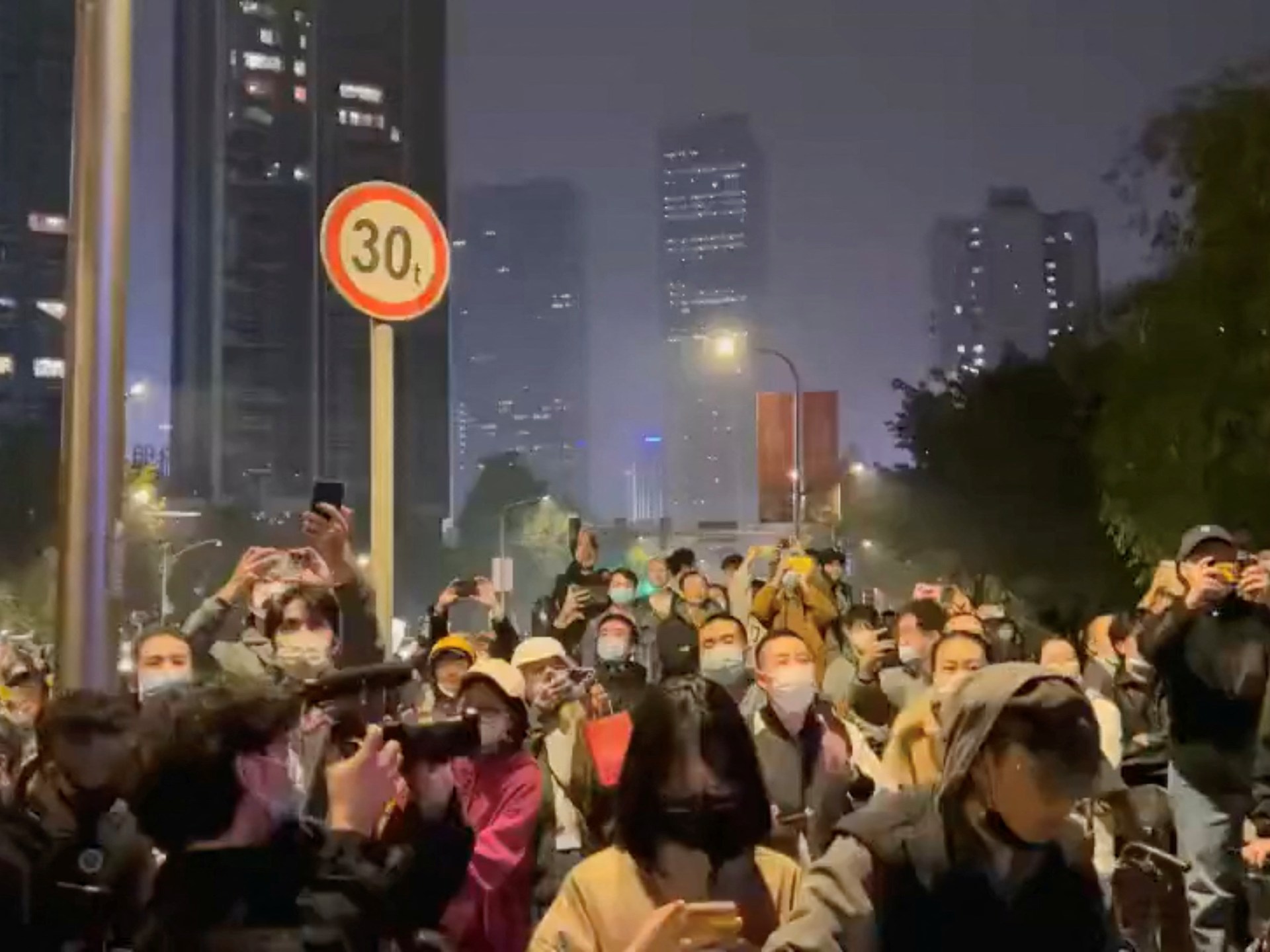Anger over China's tightening anti-coronavirus (Covid-19) restrictions has fueled the protests spreading across the country, but also revealed deep frustration against the political system in general.
Protests began in different regions, yesterday, Sunday, to demand an end to the general closure and the opening of broader areas for political freedoms, in a wave of widespread demonstrations the likes of which the country has not witnessed since the pro-democracy protests in 1989.
And last week, a fire broke out in Urumqi - the capital of the Xinjiang region (in the west of the country) - which sparked public outrage, as many considered that the general closure due to the fight against Covid-19 hindered the mission of the rescue teams.
China remains the only major economy in the world that continues to implement a very strict "zero Covid" policy, with frequent closures and quarantines and almost daily tests to detect the Corona virus.
And at a time when many expected restrictions to be eased after the ruling Communist Party congress last month, Beijing tightened restrictions, fueling public anger that is now emerging on the streets of some of the largest cities.
boiling point
"People have now reached a boiling point because there is no clear direction on what to do after the zero Covid policy ends," said Alfred Wu Mulwan, an expert on Chinese politics at the National University of Singapore.
MIT professor Yaxing Huang wrote - on Twitter - that the new leadership of the Chinese Communist Party, made up of loyalists to President Xi Jinping, is committed to the zero Covid policy.
"Before the 20th congress, there was hope for policy change, but the congress leadership line-up completely pushed away these expectations, forcing people to take action on their own," Yaxing said.
political reforms
Anger over the lockdown has turned into calls for broader political reforms.
Among the slogans chanted by the protesters on Sunday, "No to Covid tests, we are hungry, Xi resigns, the Chinese Communist Party withdraws, no to the stone ... we want freedom."
Students protested at the prestigious Tsinghua University, calling for "democracy, the rule of law and freedom of expression." Demonstrators in Beijing Sunday night chanted slogans demanding "freedom of art and writing."
In different areas, protesters held white papers symbolizing censorship.
"I don't remember any public protests directly calling for freedom of the press in the past two decades" in China, wrote political expert Maria Rybnikova on Twitter.
"What is so interesting about these protests is that the focus on one issue, the general lockdown due to COVID-19, has quickly shifted to broader political issues," she added.
The demonstrators, mostly young people with online social media savvy, organized themselves and used ingenious means to protest against state censorship, from holding white papers to posting articles with meaningless "positive" words to draw attention to the lack of freedom of expression.
"The demonstrators are very young, and the anger among the people is very strong," says expert Alfred Wu Mulwan.
Protesters in Beijing denounce the restrictions imposed on the population in the context of combating Corona (Anatolia)
Anger from senior officials
Experts say that what is of particular concern to the party leadership is the demonstrators' anger at senior state officials, considering that this is unprecedented since the 1989 pro-democracy rallies, which were severely suppressed.
"In terms of scale and intensity, this is the largest protest by youth in China since the student movement of 1989," said Jamestown Fellow Willie Wu-Lap Lam.
"That year, the students were very careful not to name the party leadership and attack it. This time they were very specific (in expressing their will)," he added.
He described the remarkable geographical expansion of the protests from prestigious universities in Beijing, to central cities such as Wuhan and Chengdu.
On the other hand, analysts warned against comparing the current protests to the bloody events of 1989.
"There may be no comprehensive demand for political reform beyond the demand for ending the zero-COVID policy," Durham University associate professor Chenxin Tsang wrote, adding, "Today's urban youth have grown up with economic growth, networking and globalized popular culture."
"The past should not limit our imagination," she added.
Police confront a demonstration in Shanghai (Reuters)
How will the government respond?
Protests in China, which are rare in the first place, often focus on local officials and companies, with "highlights being placed on Beijing to act and save people from domestic corruption".
"In these demonstrations, the central government is being targeted now because people understand that zero Covid is central politics," says Mary Gallagher, director of the Center for Chinese Studies at the University of Michigan.
But experts are divided on whether Beijing will respond peacefully or violently to the protests.
"The anger is very strong, but not everyone can be stopped," Wu said.
Peter Frankopan, a professor of world history at the University of Oxford, described the role of the police as sensitive. "There will be great sympathy, especially with younger officers. So ordering a crackdown brings risks," he said.
The leadership may be forced to confront the protest movement openly.
"(President) Xi or other senior leaders will have to come out into the open sooner or later. If that doesn't happen, there is a risk that the protests will continue later," said Willie Wu-Lap Lam, a fellow at the Jamestown Foundation.
As the demonstrations enter their third day, experts say mobilization is expected to continue.
"It seems to me that resentment is increasing rather than declining," Francopan said.

